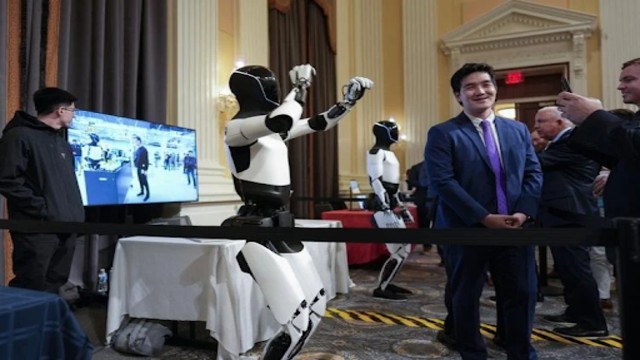
A Tesla robot is displayed as U.S. robotics companies look for congressional support to compete with Chinese companies, on Capitol Hill in Washington, Wednesday, March 26, 2025. (AP Photo)
American robotics companies are calling for a national U.S. robotics strategy to strengthen the industry and maintain a competitive edge against China. Representatives from major firms, including Tesla, Boston Dynamics, and Agility Robotics, met with lawmakers in Washington to discuss policies that could help boost the U.S. robotics sector.
The Need for a National Strategy
Industry leaders argue that the U.S. must act swiftly to secure its position in the next-generation robotics race, where artificial intelligence (AI) plays a crucial role. Jeff Cardenas, CEO of Apptronik, emphasized that although the U.S. was once a pioneer in industrial robotics, it has since lost ground to Japan and Europe.
“The next robotics revolution is powered by AI, and anyone can win,” Cardenas stated. “We have some of the best AI and robotics talent in the world, but without a national strategy, we risk falling behind.”
China’s Aggressive Push in Robotics
China is rapidly advancing in robotics, integrating AI with intelligent machines. The country has launched a $138 billion state-backed fund to develop robotics and other emerging technologies. Recently, China's Unitree Robotics showcased dancing humanoid robots on national television, signaling its progress in the field.
China now leads the world in industrial robot deployment, with 1.8 million robots operating in factories. Chinese manufacturers have also gained a significant market share, particularly in domestic industries.
What U.S. Robotics Leaders Want
The Association for Advanced Automation believes a national robotics strategy would help U.S. companies scale production, improve training programs, and secure federal funding for research. They also advocate for tax incentives to encourage widespread adoption of robotics in various industries.
A key proposal includes establishing a federal office dedicated to robotics. This would address growing international competition and the rapid evolution of robotics technology.
Lawmakers Weigh In
U.S. lawmakers agree that China is investing heavily in robotics and could soon challenge America’s technological edge. Rep. Raja Krishnamoorthi acknowledged that while the U.S. remains a leader, China’s rapid progress poses a serious challenge.
Tesla’s Jonathan Chen, a manager at the company’s Optimus Engineering division, stressed that scaling up production is essential for the U.S. to maintain its advantage. “It’s not just about creating robots—it’s about manufacturing them at scale,” he said.
The Debate Over Humanoid Robots
While humanoid robots generate excitement, some experts remain skeptical. Bill Ray, an analyst at Gartner, believes "polyfunctional robots"—machines designed for specific industrial tasks—are more practical than humanoid robots.
“We don’t like humanoid robots very much because they’re not very useful,” Ray stated. He also noted that political tensions may limit U.S.-China collaborations in the robotics sector.
The Future of U.S. Robotics
Despite differing opinions, robotics companies agree that government support is crucial for growth. Apptronik’s Apollo robot, backed by Nvidia and Google, is an example of how public-private collaboration could drive innovation.
Cardenas believes that investing in robotics education and research will ensure the U.S. remains a global leader. “Humanoids will play a big role—not just in industry, but also in inspiring the public,” he said.
With global competition intensifying, the U.S. must decide whether to act now or risk falling behind in the future of robotics.















